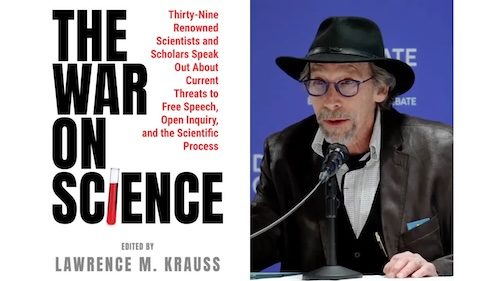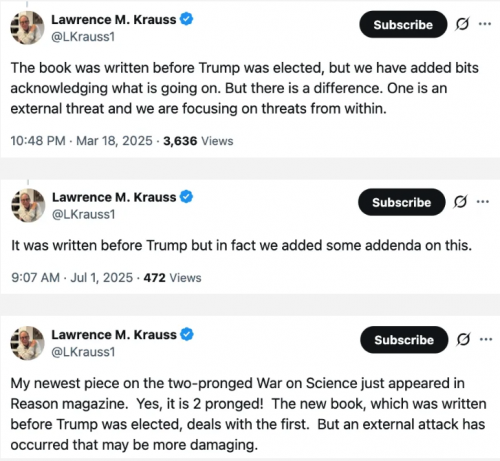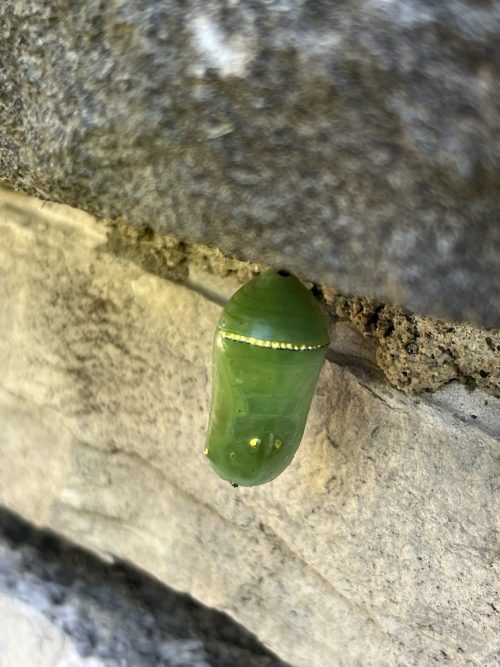There was an interesting op-ed in the NY Times today (it’s been a long time since I could say that): We Are Watching a Scientific Superpower Destroy Itself, by Stephen Greenblatt. Can you guess which scientific superpower he’s writing about?
Here are some interesting data.
According to the latest annual Nature Index, which tracks research institutions by their contributions to leading science journals, the single remaining U.S. institution among the top 10 is Harvard, in second place, far behind the Chinese Academy of Sciences. The others are:
The University of Science and Technology of China
Zhejiang University
Peking University
The University of Chinese Academy of Sciences
Tsinghua University
Nanjing University
Germany’s Max Planck Society
Shanghai Jiao Tong University
A decade ago, C.A.S. was the only Chinese institution to figure in the top 10. Now eight of the 10 leaders are in China. If this does not constitute a Sputnik moment, it is hard to imagine what would.
Given Trump’s mantra of China, China, China
to blame that country, it’s amusing and depressing that he has completely handed over leadership in science to China. OK, and Germany. He is responsible for the abrupt change in status.
The article also makes a strong comparison.
From the start, this government investment in education wasn’t free of ideological interest. It was fueled by fear — fear of the Russians, fear of the atomic bomb, fear of falling behind in the “space race” — and intended to influence curricula. Not, to be sure, in the catastrophic manner of the Soviet Union, where Trofim Lysenko’s theories of genetics set back Soviet biology for decades, but rather by strengthening science departments across the country.
…
And now, notwithstanding its triumphs, the whole enterprise is in serious trouble. The Trump administration began its assault by using the pro-Palestinian demonstrations on many campuses to charge elite universities with antisemitism. The rationale has largely shifted to complaints about affirmative action, diversity initiatives, liberal bias and the like. Scientific research has been curtailed; postdoctoral fellowships have been abruptly canceled; laboratories have been shuttered and visas denied. The damage to scientific enterprise extends beyond our borders, whether it’s from the cancellation of nearly $500 million in funding for mRNA research under the health secretary, Robert F. Kennedy Jr. — a kind of Lysenko lite — or the purging of data on which climate researchers around the world depend. We will never know what diseases might have been cured or what advances in technology might have been invented had the lights not gone out in the labs.
“complaints about affirmative action, diversity initiatives, liberal bias and the like”…sure sounds like someone we know at the University of Chicago.
I don’t know if I’d agree that RFK jr. is a Lysenko lite — he hasn’t come to the full power of a Lysenko yet, but you know that if he could he’d start imprisoning and deporting everyone who supports vaccination, for instance. Give him time. Give him a little more power and he’ll root out the Vavilovs in modern America.
What can we do?
For the moment, American universities still have the enormous advantage of their resources and their autonomy, and their joyous imaginative freedom. I walk through Harvard Yard on my way to teach a freshman course on great books from Homer to Joyce, and I am continually astonished by what I see and whom I meet. There are students from all over the world — from Mongolia as well as my hometown, Newton, Mass., from Athens in Ohio and Athens in Greece — and there are colleagues who have been immersed in a wide range of pursuits, from creating the first image of a black hole in space to deciphering the words on a scrap of ancient papyrus. We need to get up from under our desks and persuade our fellow citizens that the institutions that they have helped create with their tax dollars are incredibly precious and important.
That’s nice and optimistic, but I think it’s harder to restore prestige than that, and also we’ve permanently changed our prospects for the future — who would want a career in a US university when all it takes is a single election to completely shred our scientific institutions? We’re going to be forever aware that we’re on shaky ground.














